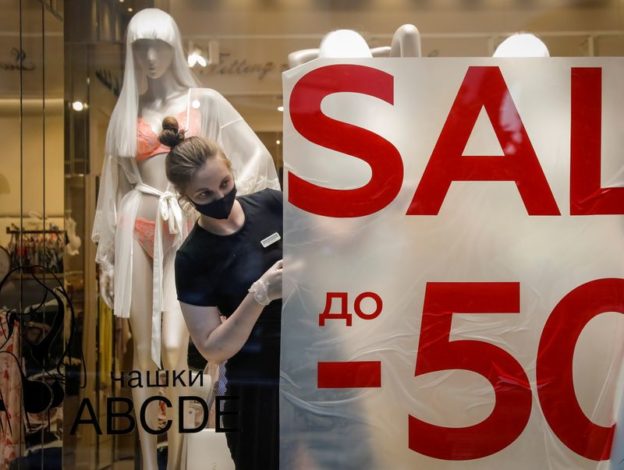Please try another search
Economy24 minutes ago (Jun 04, 2021 09:37AM ET)
© Reuters. FILE PHOTO: A shop assistant puts a sale sign on a show window in Moscow, Russia June 18, 2020. REUTERS/Shamil Zhumatov
By Alexander Marrow
MOSCOW (Reuters) -Russia’s economy avoided catastrophe during the height of the COVID-19 pandemic and is now approaching pre-crisis levels, President Vladimir Putin said on Friday, an assertion backed up by data showing a 34.7% jump in retail sales in April.
Russia’s commodity-dependent economy is on the mend after a 3% contraction in 2020, its sharpest in 11 years, when lockdown restrictions stifled economic activity, but officials say a recovery to levels of late 2019 is imminent.
Retail sales, a barometer of consumer demand and Russia’s key economic driver, rose 34.7% in year-on-year terms, the Federal Statistics Service Rosstat said, beating a 23% increase forecast in a Reuters poll of analysts.
Rosstat also said Russia’s real wages, adjusted for inflation and reported one month later than other indicators, rose 1.8% in March, below a Reuters poll foreseeing 2.1%.
“The Russian economy and labour market are already approaching pre-crisis levels,” Putin said at the St Petersburg International Economic Forum, claiming that Russia had avoided a “catastrophe” despite last year’s rise in unemployment and falling real incomes.
The unemployment rate peaked at 6.4% last year, but fell to a year low of 5.2% in April, data showed last month.
Economic growth and a recovery in living standards in Russia are a crucial issue for Putin and the United Russia ruling party. The latter is bracing for parliamentary elections in September after protests rocked the streets earlier this year.
Putin ordered that Russia’s anti-crisis mortgage programme be extended by one year to July 2022, saying state-sponsored aid to support the construction sector and households could not be stopped abruptly.
He also proposed a new support mechanism for small- and medium-sized enterprises — a loan guarantee with partner banks that could attract at least 600 billion roubles ($8.22 billion) in extra funds for smaller businesses by 2024 by giving them better access to credit.
Lending in Russia is on track to become more expensive as the central bank is expected to further raise rates amid high inflation, with the next hike possible later in June.
($1 = 72.9925 roubles)
Related Articles
Disclaimer: Fusion Media would like to remind you that the data contained in this website is not necessarily real-time nor accurate. All CFDs (stocks, indexes, futures) and Forex prices are not provided by exchanges but rather by market makers, and so prices may not be accurate and may differ from the actual market price, meaning prices are indicative and not appropriate for trading purposes. Therefore Fusion Media doesn`t bear any responsibility for any trading losses you might incur as a result of using this data.
Fusion Media or anyone involved with Fusion Media will not accept any liability for loss or damage as a result of reliance on the information including data, quotes, charts and buy/sell signals contained within this website. Please be fully informed regarding the risks and costs associated with trading the financial markets, it is one of the riskiest investment forms possible.

Comments are closed